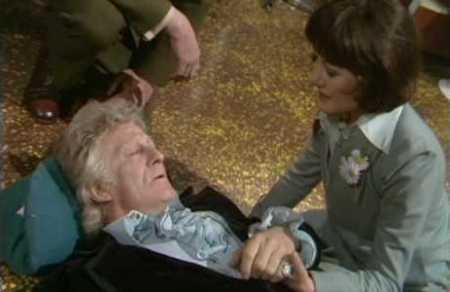Written by Robert Sloman and Barry Letts
Directed by Barry Letts
“Planet of the Spiders” is not only the final story for the oft-maligned Season 11, but also the final story for the Third Doctor. As such, it is designed as something of a summation of the Pertwee era, from the inclusion of UNIT, the usual invasion of Earth by menacing aliens, and all the padding one could possibly stand. More so, in all honesty.

The writers did make an effort to make this one special. The rampant Buddhism in the story touches on the notion of reincarnation and so forth, and so the Doctor’s eventual death and regeneration is foreshadowed throughout. There are continuity references all over the place, and as mentioned, UNIT is involved despite the fact that there is precious little for them to do. If anything, the Brigadier and the rest of the UNIT regulars like Benton play more of a familial role than any credible military one.
But that’s not the intent, and it’s obvious from the moment that Mike Yates is brought back into the picture. He serves no purpose than to be part of the Third Doctor’s sendoff in some way, and his return all but glosses over his actions in “Invasion of the Dinosaurs”. The notion that the Doctor would be so casual with a former ally who conspired to bring about the genocide of the human race is rather hard to swallow.
The titular “planet of the spiders” is none other than Metebelis III, the same planet that the Doctor visited (briefly) at the beginning of “The Green Death”. This turns out to be a bad thing, as it has precipitated (a year later) the invasion of the sentient spiders, who want their blue crystal back. Jo Grant just sent it to the Doctor, so it all fits together and links up many of the standard elements of the Pertwee era.
Sadly, this story could have been told in four episodes (or, for that matter, two). It’s extremely thin, even with the foreshadowing, the invasion, the continuity wrap-ups, and the regeneration. The only good part is the final episode, which actually leads well into the final moments for the Third Doctor. Everything before that is so stretched out that entire episodes could have been excised with no effect on the final story. (Particularly the endless chase scene in the second episode!)
Sadly, there’s just not a lot to like about this serial. It gets a lot of mileage out of the fact that it was a sendoff for the Third Doctor, and it’s one example of when the writers had plenty of time to lead into the regeneration. But as recent examples have demonstrated (“The End of Time”, in particular), this is not always a good thing, especially when the story lingers over the coming end, forcing the story to plod along as a result. Also, the regeneration itself takes place over the course of a few seconds: Pertwee transitions into Baker, and then the credits roll. Sarah Jane and the Brigadier are left to encounter the Fourth Doctor in the opening sequence of Season 12’s opener, “Robot”.
What’s odd is that the writers clearly had the time to do more than a borefest. If they could weave the reincarnation elements into the story, and even touch on the future arrival of Harry Sullivan, why couldn’t they do more with the invasion story? Granted, the end of the Pertwee era was supposed to end with a huge Doctor/Master conflict, made impossible by the untimely death of Roger Delgado, but even a quick development cycle for the story doesn’t explain many of the flaws in the story.
As much as I enjoyed the Third Doctor, I have to agree with those who said Season 7 was the only consistently good one. After that, the narrative began to fall apart, with too much attention spent to watering down UNIT and making things more “accessible”. Even the introduction of the Master, a long-awaited moment, was a disappointment, given how his ambitions never made much sense. Season 7, by contrast, delved into solid social and political commentary along with using UNIT as an actual military presence.
This is also the first time that I am ending a Classic Who run having seen each and every serial featuring that era’s Doctor. It definitely feels like the end of an era, though also one that has been a long time coming. I’m more than ready to see a new take on the series, after the diminishing returns of the later serials of the Third Doctor era, especially when I’m well aware that the Fourth Doctor is one of the most beloved.
Writing: 1/2
Acting: 1/2
Direction: 1/2
Style: 1/4
Final Rating: 4/10

